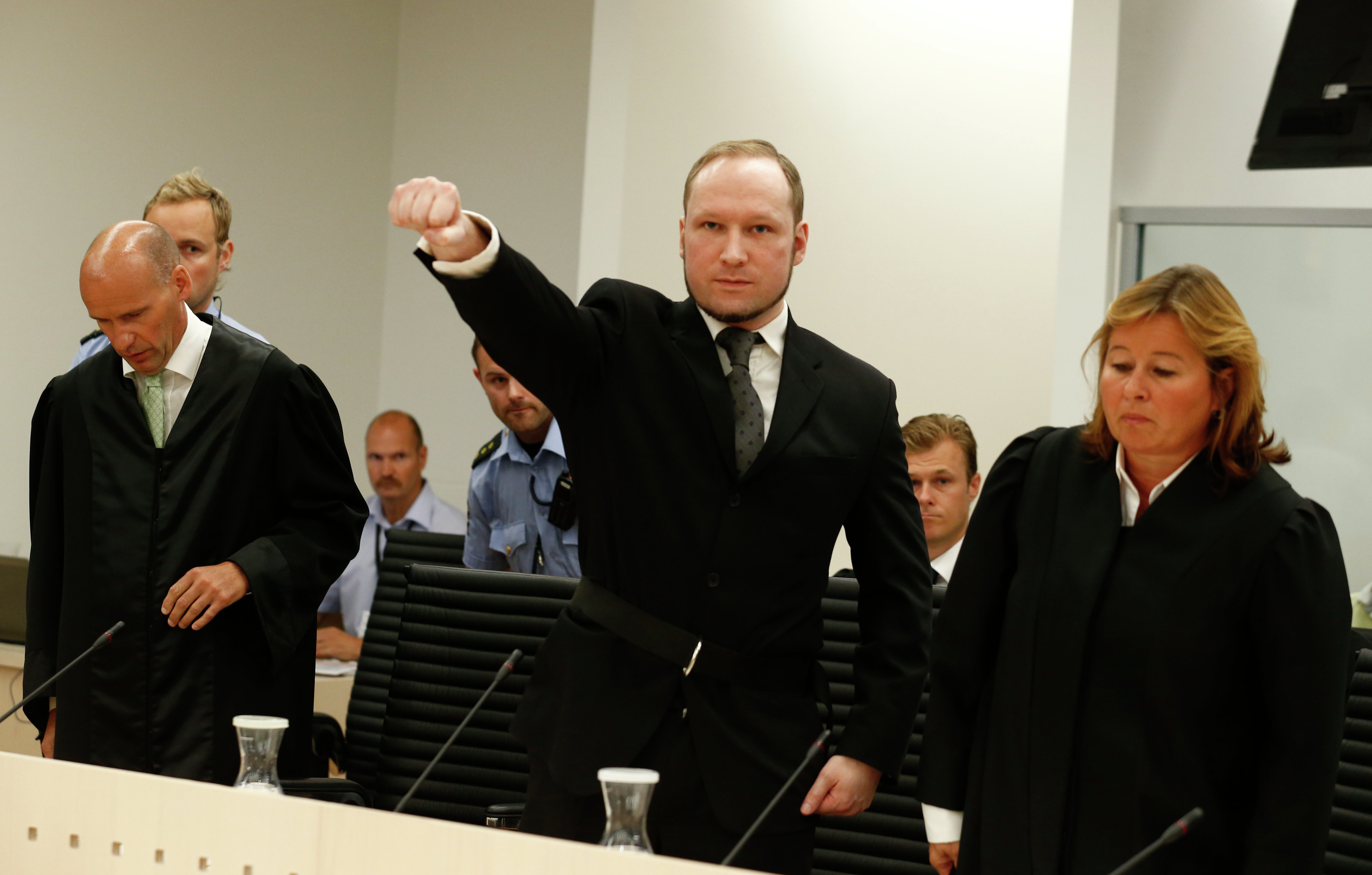OSLO, August 24 - RAPSI. The Oslo District Court has sentenced Anders Breivik to 21 years in prison Friday in connection with the 2011 terrorist attacks in Norway that left 77 dead. According to the court, Breivik carefully premeditated the attacks and his commission of them exhibited a level of cruelty "without parallel in Norwegian history."
His 21 year sentence is the maximum permissible under Norwegian law, but he was sentenced using a mechanism referred to by the court as “preventative detention.” This mechanism will allow the court to keep Breivik in prison for as long as he poses a threat to society. The court opted for preventative detention rather than a standard prison sentence based on two factors: the severity of the crimes committed, and the likelihood of recidivism. The court found that if released back into a multicultural Norway at the age of 53, upon completing his sentence, Breivik may very well still have the will and the capacity to commit additional atrocities.
Please find the full text coverage of the hearing here and the video broadcast here.
The response of the defense
As convicted terrorist Anders Behring Breivik’s sentencing hearing drew to a close Friday, the defendant made clear his refusal to appeal the court’s verdict. Given the opportunity to assert his claim to an appeal, Breivik attempted to make a broader political statement. With incredible composure, he ranted that the court lacked legitimacy because it was given its mandate by a political party that fosters multiculturalism in Norway.
He then explained that he wished to issue an apology, and then directed said apology to nationalist militants in Europe. He was unable to explain this statement as the judge promptly interrupted him, declaring that he was not permitted to speak to parties outside of the courtroom. She called on Breivik’s attorneys to contain their client. Moments later, the judge accepted Breivik’s tirade as a declination to appeal.
Journalists present in the courtroom claim to have heard Breivik apologize for not having killed more victims. When asked during a press release whether Breivik had expressed such sentiment, his defense attorney said that he heard the same thing the journalists heard, essentially confirming. He would not say anymore on the topic of Breivik’s attempted diatribe.
The response of the prosecution
At a general press conference held shortly after the hearing was adjourned and live-streamed by the BBC, the prosecution announced its decision not to appeal the court’s decision. Explaining its decision, the prosecution pointed to consideration of the burden these proceedings have placed on the victims and society as a whole.
The prosecution was vocal, however, in explaining the differences of opinion it had with the court. The most central such difference was that of Breivik’s sanity during his commission of the attacks. Specifically, the prosecution argued that the court should have placed more weight on the first expert report, which found that Breivik was not of sound mind during the attacks.
Room for appeal anyway
Both the defense and prosecution confirmed after the trial that it is still technically possible for Breivik to appeal the judgment. The nature of Breivik’s statements at the end of the hearing created a certain degree of legal ambiguity. Specifically, he couched his declination of appeal within the context of his view of the court’s illegitimacy.
Furthermore, the option hypothetically exists that Breivik could appeal to a higher external court, such as the European Court of Human Rights.
Still, when asked about the likelihood that Breivik might appeal, both the defense and prosecution seemed confident that he would not. Both based their respective analyses on the fact that Breivik clearly stated his intention to accept the judgment.
The formal deadline for launching an appeal is two weeks from the time of judgment, so until that time it will remain a possibility, albeit a small one, that Breivik might appeal.
Background information
While Breivik has confessed to having killed eight people in an Oslo bombing, and having gunned down another 69 at a youth camp on nearby Utøya Island on July 22, 2011, he has refrained from admitting guilt for the crimes that he has been charged with in this connection, claiming that he had acted in “self-defense.” In the mind of the 33-year-old Norwegian—whose sanity has posed a central issue throughout the trial—his actions were necessitated by what he perceived as the threat of multiculturalism in Norway, and as such, he has requested acquittal.
Breivik was formally charged last March with acts of terror and voluntary homicide.
Norwegian freelance journalist Fredrik Walløe, who has translated the indictment in full, explained the substance of the charges pending against Breivik as follows:
“Anders Behring Breivik is charged with two counts of terrorist acts under Norway’s formal terror law.
[He] is charged under § 147a of the Criminal Code, because the twin attacks ‘seriously disturbed a function of fundamental importance in society, like the legislative, executive or judicial power, energy supplies, secure supplies of food or water, bank- or money system or health system and disease control, and created serious fear in the population’.
Out of the 69 mostly young people murdered on Utøya, 67 were shot and two lost their lives trying to escape the mass murderer. Out of the 67, many were executed with a shot to the head.
There were murders in the first degree, with extremely aggravating circumstances.”
The ensuing trial centered largely on his soundness of mind. The two psychiatric evaluations conducted on Breivik during the course of the proceedings produced conflicting results. The first held that he was psychotic, thus prompting prosecutors to suggest he carry out his sentence in a psychiatric ward. The second held that he was of sound mind.
Please find the full text coverage of the hearing here and the video broadcast here.



